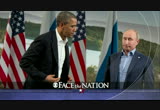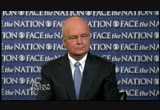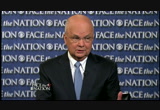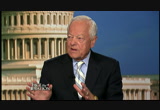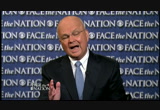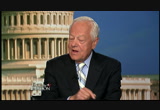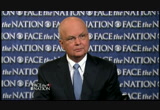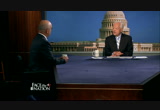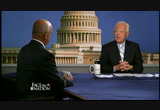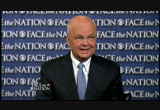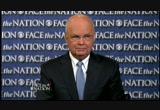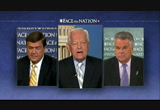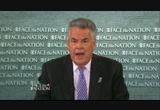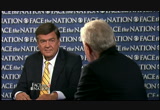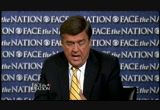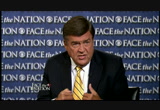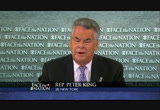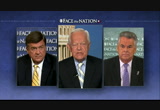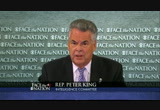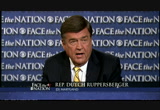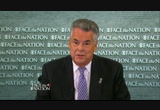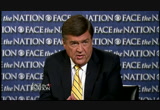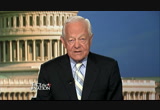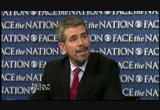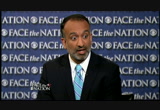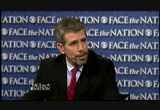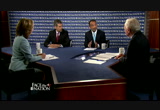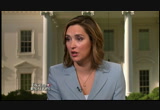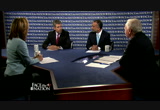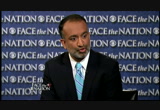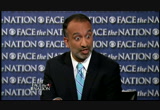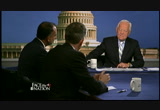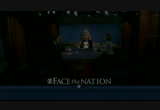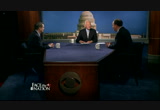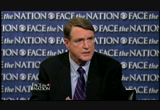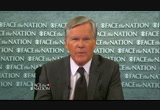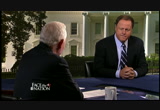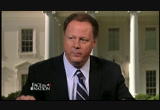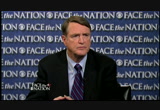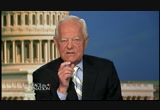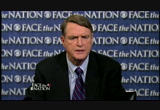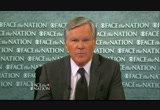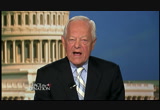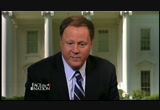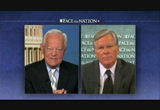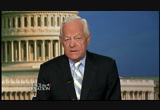tv Face the Nation CBS August 11, 2013 8:30am-9:31am PDT
8:30 am
>> schieffer: today on "face the nation," the president says americans need to know more about national security agency spy programs, and he's going to tell them. >> it's not enough for me as president to have confidence in these programs. the american people need to have confidence in them as well. >> schieffer: we'll hear from some top intelligence officials as to why they shouldn't be changed, including the top democrat on the house intelligence committee, dutch ruppersberger. republican congressman peter king of new york. and the former c.i.a. and n.s.a. director general, michael hayden. plus, what's next for u.s.-russia relations now that the president has canceled his upcoming meeting with president putin? we'll have analysis from raj rajaratnam of the "washington post." eric schmitt of the "new york times."
8:31 am
and cbs news state department correspondent margaret brennan. and we'll look at another story that rocked washington, the sale of the "washington post". we'll talk about the future of newspapers with former "washington post" editor len downie. former "new york times" editor bill keller. and john harris, editor in chief of politico. there's a lot to cover, but this is "face the nation." captioning sponsored by cbs from cbs news in washington, "face the nation" with bob schieffer. >> schieffer: and good morning again, michael hayden who served as both the c.i.a. and n.s.a. director now consulted for the cherdov group here in washington, joins us as our lead guest this morning. general, the president made that news conference on friday, and he said the american people need to know more about what the national security agency is
8:32 am
doing because there are a growing number of people in the congress who are wondering is the n.s.a. infringing on americans' right to privacy? what do you think-- you ran the place. what do you think is is the most significant thing that the president side? >> well, it was a very interesting speech, and it was a speech in front of a press conference. to me, the most telling thing he said was perhaps something he didn't quite say. he didn't suggest he was going to operationally change this program. i mean, there's no suggestion that what he was doing and what president bush was doing before him with regard to these programs was anything other than laughful, effective, and appropriate. so that's i think the first thing. he also suggested -- and i think it's heartening for people with backgrounds like me and particularly folks who are still doing this kind of work-- he suggested the oversight regime for this was already quite good. he pointed out there have been no abuses under him or under his predecessor, but he does have
8:33 am
this issue of confidence, this issue of transparency. so the president is trying to take some steps to make the american people more comfortable about what it is we're doing. noose going to be hard because, frankly, bob, some steps to make americans more comfortable will actually make americans less saifd. >> schieffer: well, you know, some of the privacy advocatewhen they hear you say the good news is what he didn't say, he's not going to change anything. that might cause them to be a little uneasy. >> if you look at the commentary on this, folks from the so-called left, are a bit uneasy. they don't want a little more transparency with regard to the metadata program. they want the program stopped. i don't think it will be. >> schieffer: let me ask you a little about one of the things he proposed for the fisa court. this is the court that meets in secret. and any time n.s.a. comes across something they think we need to go in and listen in. because they don't listen in, just because they get a tip or something.
8:34 am
they have to go to this court to get permission to listen in. >> if the target is an american person. >> schieffer: if it's an american person. now one of the things the president is talking about doing is adding a kind of privacy advocate on to the court. this would be someone that when the government comes in and says, "we need to go in and wiretap this person. we need to eavesdrop," this person would say, "wait a minute here. that's going to far. you really don't have a reason to do that." is that workable? >> you know, the president was, i think, quite artful with that portion of his commentary. he didn't quite say what you said. there are two kinds of decisions that the court makes. one is getting a warrant on an individual person. the other, these broad questions of lawfulness about broad programs, i think the president was talking about that and not talking about getting a public defendener there for tony soprano every time you want to go up for a wiretap on him.
8:35 am
the question becomes is that more narrowly defined, that privacy advocate is a good or bad idea? it may be useful for transparency, bob. it may be useful for confidence, but let me tell you, looking through your windscreen when you lay this on, it just looks like more thorough oversight. when you're looking in your rearview mirror after the next successful attack, this runs the danger of looking like bureaucratic layering so you need to be careful how many processes put in there, even though i freely admit you don't get to do this at all unless the american people feel comfortable about it. >> schieffer: let me just cite an example. let's say the n.s.a. runs across something they think an attack on the country is imminent, and they want to go into the court and say, "we've got to do this right now." is it feasible? is it practical? is it even possible to say, "wait, let's argue this a bit?" i mean, it would seem to me that time was was essence.
8:36 am
>> it's involve of the essence. if it's just going up on a specific number, i think that can happen rather quickly, and frankly, i don't think the president is arguing for an advocate there. if you find yourself in a period of increased danger-- let me make something up, bob. this is no one's proposal. you have this metadata here. it's now queried under very, very narrow circumstances. if the nation suffers an attack, there are other things you could do with that metadata. there are other tools. so in that kind of an emergency, perhaps you would go to the court and say, "in addition to these very limited queries we're now allowed to do, we actually want to launch some complex algorithms against it." that's the kind of argument that, frankly, even i could accept you might want to have an advocate there. >> schieffer: do you think, general, that the public understands what it is the n.s.a. is doing? >> no. >> schieffer: they have this large collection of phone numbers, but if i understand it, they're not listening in onem pee's conversations.
8:37 am
>> no, no. >> schieffer: they don't do that until they getta a court order. >> that's right, to target an american. the president was quite candit in his commentary. he pointed out when he was senator obama and wasn't quite fully knowledgeable about these programs he was opposed to them and only when becoming president obama and saw what was going on became a very forceful advocate for them. >> schieffer: the president was asked-- says now that you're saying we need to shine some more light on this, now we need more transparency, he said he was-- he was asked, "does this mean now nathat edward snowden was a whistleblower? do you have a different idea?" and he said, "well, he's not a patriot." what do you think of edward snowden? did he do us all a service here by bringing this forward? >> i'll offer two comment. i've actually thought about this. clearly the debate was coming. he accelerated it. he didn't inform it. he made it more emotional.
8:38 am
there are some real downside to what he's done. i'll give you an example. you and i witnessed katrina. the levees around lake ponch train are the strongest they've been in a century but katrina was still a bad thing and that's how i view mr. snowden. as regard to how to categorize him-- we used to have a word for somebody who stole our secrets who got the job to steal our secrets and then he moved to with those strets to a-- secrets to a foreign country, and they weren't called a whistleblower. >> schieffer: some of the people quoteed in the "washington post" today suggest some of the classified briefings the n.s.a. has given to members of congress were at best inadequate, that they felt like they were having to play 20 questions, if they couldn't think of the right question, they weren't going to get the answer they deserved.
8:39 am
has the agency been candid with members of congress whose job is to hold oversight on them? >> the agency's been tremendously candid, and let me apologize to members of congress that this is just a complicated subject, all right? and it's just hard to understand. i used to do this briefing under president bush's terrorist surveillance program. we would huddle up about once a quarter before we briefed congressional leadership, my guidance to my people at fort meade was i want to be full monty here. i don't want anyone to be able to say when it becomes public-- which we knew it would be-- "well i got some sort of briefing." i wanted them to know exactly what we were doing and the scale on which we were working. by the way, every member of congress was instrietd read a letter in '09 and 2011 that specifically said, "we are gathering the metadata on all calls in the united states." >> schieffer: do you think the congress should be criticized? do you think they've not been doing their job? not because it's the fault of the n.s.a., but-- >> look this is really hard.
8:40 am
it is-- it is really complicated. you don't need ill will on either side to make it difficult to communicate on subjects as obscure and as technically vibrant as signals intelligence is, but it really does require a great deal of work. chairman rogers, chairman of the house intel committee said, "hey, look, if you don't have time to be a member of the intelligence committee and dedicate your time to it, then you shouldn't be a member of the committee." >> schieffer: some people say the president was just being preemptory here, that the congress was getting ready to take away some of the ability that the n.s.a. has to do some of the things it does. what if they did do that? >> you're referring to the vote, a 12-vote margin a couple of weeks back. bob, that wasn't regular order. that wasn't thoughtful procedure. let me be a little critical here, all right. that looked a lot like mob action. people acting out of emotion with a false sense of urgency,
8:41 am
and with a great deal of misinformation. >> schieffer: but would the national security be damaged if that happened? >> oh, absolute, absolutely. >> schieffer: all right, well, general, it's always good to have you. and thank you for being with us this morning. we'll be back to stalk to two members of congress who have that oversight responsibility in just a minute. anging hands onli. that's why hp built a new kind of server. one that's 80% smaller. uses 89% less energy. and costs 77% less. it's called hp moonshot. and it's giving the internet the room it needs to grow. this&is gonna be big. hp moonshot. it's time to build a better enterprise. together. on my feet and exactly where i needed more support. then, i got my number. my tired, achy feet affected my whole life.
8:42 am
until i found my number. i tried the free dr. scholl's foot mapping center. in two minutes, i got my foot map and custom number. i'm a 440. that matched up to the dr. scholl's custom fit orthotic inserts with the right support and cushioning i need. i am a believer. i'm a believer! i'm a believer. go to drscholls.com to find your closest walmart with a foot mapping center. >> schieffer: joining us dutch ruppersberger, and in new york, congressman pete king, who is on both intelligence and the homeland securities committee. let me just start with you, congressman king, up there in new york. you heard what general hayden said. do you think that the reforms the president announced on friday are necessary? you came down pretty hard on him. you said this is-- the problems we have here is just a failure by the president.
8:43 am
what did you mean by that? >> bob what, i mean is i fully support the n.s.a. program. it's been effective. it's done an outstanding job. general alexander, the head of the n.s.a., is a true patriot, and i applaud the president for continuing the n.s.a. program. what i'm very critical of him is basically he's been silent for the past two months. he allowed the edward snowdens and others in the world to dominate the media and now we have people thinking the n.s.a. is spying on people, is listening to our phone calls, is reading our e-mails and to me for some reason he had dutch ruppersberger out there, mike rogers out there. i was doing what i could do, saxby chambliss, all defending the program. the president should have been out. he's the commander in chief. we're in a very desperate war with al qaeda terrorists and their affiliates and the president of the united states as commander in chief had the obligation to be aggressively and effectively dividending his program and he really didn't do it. and even the other day when he was at the news conference-- i agree with general hayden. i believe the from the wants to
quote
8:44 am
keep the program going-- but i thought there was too much equivalency there. i think he should have denounced snowden. he is not a patriot. he's a person endieted for espionage. in the program there are so many misperceptions out there and i think it's partly because the president who has the bully pulpit did not use it during the last several months when people in my party, dutch's party, people in congress were, i think, being very irresponsible. i think the vote
8:45 am
classified information. this individual said he went in for the purpose of getting information. he turned his back on his country. where did he goonce he got this information? he went to china and then he went to russia. that speaks for itself. bottom line, we need to move forward with this. i think anyone working in the intelligence area, including the president, understands this program helps protect us. it really might have protected us from 9/11 attack because we didn't know that one of the terrorists was in san diego in the united states, and if we would have known, that it might have helped. >> schieffer: do you think any reforms are necessary? >> yes, and thgths reason. we in politics have to deal with perception, not just reality. and we need to do better in educating our public so they are not fearful that we, the government, are violating their privacy. that's very important. chairman rogers and i, chairman feinstein and chambliss, we all on the intelligence committee, went to the white house -- and i applaud the president for bringing us there-- and talked about how do we educate the
quote
quote
8:46 am
quote
8:47 am
quote
quote
8:48 am
8:49 am
american is put at risk in the world or in our homeland, we have to deal with it. we have to be cautious. it wasn't just one incident. there is craiberation occurring and strong intelligence, especially in yenl. we have done a good job in afghanistan and pakistan, dealing with the core of al qaeda. but al qaeda in the arabian peninsula is getting stronger and their focus has been the united states. if you recall laky brought to justice, targeted the united states, the shoe bomber, cartridge bomber and they keep focusing on the united states. so we have a lot of work to do. it's not just us. it's also our allies working to the these issue glz do you think they over-reacted, congressman king? >> no, bob, i don't. i agree with dutch. the intelligence i saw here was at least as powerful as anything i have seen since 9/11. the closest would be the be liquid explosive plot in london in 2006. this was very credible. it was corroborated and it spoke of a massive attack and to me it was the right thing to do.
8:50 am
now, i think we should stay on this. if we do get through this without there being an attack, i do think we have to be more aggressive. we should be doing more interrogating to try to-- to head these off in the future. but, no, the president did the right thing. and i think we should try to put partisanship aside here-- and i've been very critical of the president on certain aspects. when it doms this, we can't be critical of benghazi because there was not enough protection and now to say, we're being critical because there's too much. it's best to opt to secure american lives, especially in this situation. this was really out of the ordinary. in an extraordinary world, this is the most extraordinary i've seen in at least the last seven years, and i think dutch would agree with that. >> i would. >> schieffer: can either of you give me more detail on why you thought it was so serious, congressman ruppersberger. >> we can't give out sources and methods but we got a lot of intelligence from high levels in al qaeda, both with leadership and also in the arabian peninsula. we also just got other source of information.
quote
8:51 am
we check craiberation, and clearly the people of al qaeda and the terrorists and jihad, they're out there planning every day to kill us, and that's why it's so important we do the best we can. the best defense against terrorism is intelligence. we have men and women who work at the nsay, work at the c.i.a., they get up every morning thinking they're helping their country, and they do it pursuant to laws and we is checks and balances. we have to do better and we will. we're going to have more legislation but year not going to hold people's hands behind their backs and say you can't do this and you can't do that but we have to do it pursuant to law. i'm happy the president has made this an issue. >> schieffer: congressman king, what was it, if you can say, that convinced you that this was the most serious thing since what we were finding out about in the days after 9/11? is there any specific thing? >> yes, there were several. this was not a case of connecting the dots. this was clear, explicit intelligence, and evidence, and that's as far
quote
8:52 am
8:53 am
of your points. >> schieffer: thanks to both of you. i'll be back in just a second. chronic plaque psoriasis e started getting in the way, that was it... it was time for a serious talk with my dermatologist. this time, he prescribed humira-adalimumab. humira helps to clear the surface of my skin by actually working inside my body. in clinical trials, most adults with moderate to severe plaque psoriasis saw 75% skin clearance. and the majority of people were clear or almost clear in just 4 months. humira can lower your ability to fight infections, including tuberculosis. serious, sometimes fatal events, such as infections, lymphoma, or other types of cancer, have happened. blood, liver and nervous system problems, serious allergic reactions, and new or worsening heart failure have occurred. before starting humira, your doctor should test you for tb. ask your doctor if you live in or have been to a region where certain fungal infections are common.
8:54 am
tell your doctor if you have had tb, hepatitis b, are prone to infections, or have symptoms such as fever, fatigue, cough, or sores. you should not start humira if you have any kind of infection. make the most of every moment. ask your dermatologist about humira, today. clearer skin is possible. plays a key role throughout our lives. one a day women's 50+ is a complete multivitamin designed for women's health concerns as we age.
8:55 am
with 7 antioxidants to support cell health. one a day women's 50+. agree with the columnist charles krauthammer but i enjoy his column, and he had a good one last week on the linguistic hoops that the government jumps through to make the news seem better than it is. as when our embassy in yemen was evacuated because of a terror threat, and the state department referred to it as as a "reduction in staff." as when homeland security chief janet napolitano referred to terror attacks as "man-caused disaefortz." he notes the episode at fort hood where an army doctor who
8:56 am
said he killed 13 of his comrades in cold blood because he was a proud soldier of allah, is officially listed as "workplace violence" not an act of terror. this is nothing new. when the news goes bad, governments invent new words and phrase foz explain it. during the vietnam war, newly invented phrases like "collateral damage--" a kinder way of saying innocents killed by bombs meant for others. and "terminated with extreme prejudice--" read that, murder-- became part of the lexicon. it never works because people are not stupid. but government never seems to learn that good public relations never trumps bad policy, and bad p.r. never defeet good policy. nixon's men mounted a massive p.r. campaign to cover up watergate. it failed. the good things nixon did-- the opening to china for one-- live on with no p.r. help.
8:57 am
if we want to cut the federal budget, why not start by eliminating the people whose job seems to be inventing these new words and phrases to make the news seem better than it is. it's a waste of their time and our money. back in a minute. tiny changes in the brain. little things anyone can do. it steals your memories. your independence. ensures support, a breakthrough. and sooner than you'd like. sooner than you'd think. you die from alzheimer's disease. we cure alzheimer's disease. every little click, call or donation adds up to something big.
8:58 am
her long day of pick ups and drop offs begins with arthritis pain... and a choice. take up to 6 tylenol in a day or just 2 aleve for all day relief. all aboard. ♪ our stations are leaving us now. but for most you, we'll be right back with a lot more "face the nation." ♪ [ male announcer ] wouldn't it be great if all devices had backup power? the chevrolet volt does. it's ingeniously designed to seamlessly switch
8:59 am
9:00 am
schmitt, and margaret brennan. eric you wrote a lot about the threat to shut down the embassies. the embassies are now open. is there anything new on this? what is the latest on this threat? does the government think it's still out there? >> the latest, bob, as you said, all but one of the embassies has reopened. the one is that still remains closed is the one in the capital of yemen where counter-terrorist officials believe the threat emanated from. last night there was the ninth drone strike in yemen, the ninth in two weeks. what is striking about this is the flurry of drone strikes that have coincided with this increased threat, basically going after operative oltz the ground in yemen that the u.s.
9:01 am
believes may have been part of this plot. the u.s. still does not know exactly what the target was of this plot. it force the the closing of these embassies but they believe it emanated from yenl and believed there was probably going to be some kind of attack against american interests, perhaps embassies, in yenl itself. there is still concern about this today. >> schieffer: let me ask all three of us this because this is the question i asked the congressmen-- does anybody have an idea about what it was about this threat that caused them to take it so seriously. rajiv? >> we have not heard specifically what that communication was between alzawiyah heery, the cirnt leader of al qaeda, and the leader of al qaeda in the arabian peninsula affiliate based in yemen but it was significant enough and described as one of the most significant bits of intelligence chatter picked up in years that led to this. and it comes at a time of heightened scrutiny post-benghazi, bob. >> would agree with that. we are in a period of heightened
9:02 am
scrutiny post-benghazi, the question is really has the security improved enough to protect our diplomats abroad? this immediate threat you have seen with the reopening of embassies people turn the page on, but there will be extreme nervousness coming up, going through the september 11 holiday. there are questions back in washington to ask who has their shoulder behind this legislation to improve funding and improve security at consulates or is our new reaction order departure, a c-17 lands at dawn and every american has to get to every time we see this wide-ranging threat? i think there are real questions about how we gauge risk and our interests abroad now. >> schieffer: you wrote a piece in week, eric, where you talked about the evacuation may not have made us look all that great to those who oppose us. >> that is right. there were someone, particularly early on in the jihadi forums, who claimed a victory. even though the plot didn't carry forward. it had its effect. it was disruptive of american operations across the middle east and in south africa.
9:03 am
that being said, the united states, as margaret has said, is still worried about the threat post-benghazi and they weren't going to take any risk glz do you have any idea what specifically it was that caused them to take this so seriously? >> again, even the u.s. intelligence officials i talked to as early as this morning still do not know exactly what the target was, but they believe at least one of the targets would have been in yemen. >> schieffer: margaret, does the state department think this threat has passed now? >> well, are weopening the embassies there is the idea that the immediate threat is less intense, but there's going to be hideeped security. there already is increased security at high-threat embassies. so, no, they don't believe that risk is totally gone here. and you saw that with the ordered departure from the consulate in lahore. >> we're in a fortress environment. the two embassies that opened the soonest were baghdad and kabul place where's we have walls and walls and legions of guards. that's going to be the new federal in parts of the middle
9:04 am
east. even when these embassies reopen, bob, we should recognize that, you know, this isn't really the old diplomatic business as usual. our diplomats aren't always as free as they should be in the past to go out, take the pulse on the streets. when events were unfolded in tahrir square, we didn't have very many diplomats from our embassy in cairo walking through the protests. it's not safe for them to do. they're largely contained within those thick blast walls that surround these billions. >> schieffer: i want to talk a little about the peace talks that secretary kerr setrying to get going against gwen. i guess it's supposed to reconvene, margaret, in a couple of days, and today the israelis said they will go ahead with new settlement apartments on the west beeng. >> settlements are considered illegal under international law. it doesn't help the palestinian position in building trust coming into the talks that start on the 14th and more talks later on in jericho to be held in the next few days. but the way the u.s. is sort of
9:05 am
digesting it and saying we can can still go ahead with this, they can say it was previously announced and they're just getting built now. it's damaging, and you can't say it's not. >> schieffer: i want to talk about pint and the relations between the united states and russia which are obviously not what we would hope them too to be. eric, why do you think putin has taken the position and sort of the direction he seems to be going with relations? i mean, i'm not sure i understand what he thinks he gets out of this. >> certainly, you have the conflict in yemen-- excuse me, in syria. that's one of the main flashpoipts here between the u.s. and russia. the syrians are one of the biggest clients for arms for the russians. they also have a port there that they use. here you have a conflict between the two countries there. clearly the most immediate flashpoint is the russians' acceptance of edward snowden and the asylum claim that he has. that is basically what prompted the president this week to announce he will not hold a
9:06 am
summit with the russian leader, as he had scheduled, and brought the comment that the president made, talking about the tensions and trying to deny there are personal tensions but, clearly, between the two men this is a major irritant. >> schieffer: what i don't get, though, is why pint has decided this is the way to go. i mean, it's almost like he's taken hugo chavez as his hero here, as his role model. why would the leader of russia take that position? i dont understand what he thinks he's going to get out of that. >> it's something that plays well at home in a growing anti-american sentiment in russia. it's certainly rallying the nationalist base over there. and, look, this is the culmination of over a series of disagreements between the united states and russia. not just snowden, not just syria, iran, human rights issues, trade issues, arms control issues. tom donelan the former national security adviser went to moscow
9:07 am
this spring with a letter from the president trying to kick-start an arms control discussion over to get rebuffed, essentially, by putin. on every single major set of issues, there is fundamental disagreement. and so you see the white house now saying, "look it's time not to just reset this relationship but take a fundamental pause." >> interestingly, the position of juxtaposing what the u.s. wants has in some ways empowered russia on the international stage, arguably so with syria where they've become more erch trenched and emphasized we still matter not only because we're a nuclear power but we have a veto on the security council and we can stop you. the anti-american sentiment helping putin at home has international consequences. they have real stakes in syria now. >> iraq is the immediate cost of all of this. the decision to grant snowden temporary asylum, the cost here is millions of syrians suffering in this bloody civil war. >> schieffer: speak of bloody,
9:08 am
iraq seems to be worse than it has been in years. what is it now, 69 people killed there yesterday. last month, more than 1,000 iraqis were killed. is the whole thing coming apart? >> it certainly seems to be getting worse, and there are a couple of signs here, talk about the spread of violence. you had a major prison break in iraq along with others in places like libya where you have al qaeda operatives apparently helping these guys to break out so you have more terrorists spilling out into the field. but you also have the leader of al qaeda in iraq exerting more force and basically saying they are now in charge of the al qaeda affiliate in syria. this is a major development because it links even more tightly the iraq affiliate in iraq with the current violence in syria, and it only capacker base the tensions. >> schieffer: where does this lead? >> the violence is horrentous. yet, most of the killings being committed by sunni mill tantz
9:09 am
linked to al qaeda, most of the victims are shiites. thus far, what we haven't seen is a lot of activity by the shiite militias to go and target sunni communities. and, you know, if there's any hopeful sign at this point is that those militias, those shiite militias haven't yet fully joined the fight. if they do-- and they could very easily-- if they do we're into anule-out civil expwar getting back to the depths of the violence that racked the country in 2006 and 7. we hope we don't get to that point. >> schieffer: all right, i'm going to have to leave it there. plenty to think about, and write about and report on, on the foreign piece these days. we'll be back in just a minute.
9:10 am
9:11 am
stations around this country. it sent shockwaves through this city last week. the sale of the "washington post". the newspaper of wood board and bernstein, owned by the legendary graham family, the sale was to the c.e.o. of amazon.com jeff bezos. here to talk about it, one of the former editors of the "post," len downie, who i think the newspaper won a record number of puleitzers under your reign. also in new york, the times former editor, bill keller. he's in our studio there. and we're joined by john harris, whoitudes work at the "post" and today is a columnist for the "new york times" says you may well be responsible for the decline of the "washington post" because you left the "post" and formed politico, john. we're glad to have you sitting across from len. let me just talk with you first, len. was the sale of of the "post" to
9:12 am
jeff bezos a good things? >> i'm cautiously optimistic it will be a good thing for several reasons. the "washington post" company as it's currently called is a public company, the corporation is. so it had to-- it could not tolerate losses year after year in the newspaper, as don graham said he didn't want to keep cutting anymore in order to make the bottom line work out. jeff bezos bought it with a private company, a family company, ironically, as the graham family was before they became a public company so that he doesn't have those same restraints, those quarter-by-quarter reports that you have to give, the concern about shareholders. so it's now up to him to decide whether or not he's going to spend money that he has to spend and tolerate losses to do the kind of investing, particularly in digital change, that is necessary to take what was once a newspaper-- and is already a multimedia, multiplatform news organization-- and make it profitable. >> schieffer: bill keller, in new york, the "new york times" is very much like the "washington post." it is a publicly traded company, but one family, the saltzbergers
9:13 am
own most of the stock, the controlling stock in the company. do you think the "times" is going to be sold or it will remain as it is? >> well, obviously, i don't speak for the saltzberger family or the "times" but i would be very surprised. they have been quite emphatic saying that the "times" is not for sale. when you think about it, there's no reason why it would be for sale. i mean the "times" is not in need of a rescue, to the same extent the "washington post" was. we got out early on digital. we've turned the newsroom and the business side into a pretty inventive laboratory of how to exist in this new world. the company has sold off enough assets to generate some cash so we can invest in trying new things. so i don't think there's any particular reason for the "times" to be looking for a buyer. and the families-- the salzberger family has always seen this as a sort of sense of mission that they're deeply
9:14 am
dwroated to. >> schieffer: well, let me turn now to john harris. russ dohout, wrote in the "new york times" it's possible to date the moment when the "post" was no longer the first place washington turned to for political news. it happened in 2006, when john harris and jim vandehei, left the "post" to found plitdico, which is the web site all about politics. john, there's no question that politicos that had a major impact on the world of journalism now. and i think it is absolutely true that a the love people who used to turn to the "post" first for political news now turn to your organization. how do newspapers fit into this new world we're in now where we have web sites like yours and there are going to be more of them, and we have newspapers? >> politico, the organization that i run, is very different in its mission and its purpose than a newspaper like the "washington post" or the "new york times."
9:15 am
we aim to cover one thing and dominate one subject, a particular niche-- politics and policy making here in washington. those institutions, great institutions, and i grew up at the "washington post." it's still part of my values. they're a broad-focused organization. so the business challenge and the editorial challenge is much different. i do think-- and i welcome jeff bezos coming to the "washington post." i think it's going to quicken the pulse of the "post" and the entire city. it's going to be a good thing. we're not going to ever return to a stable status quo where we have editors know where their audience is, publishers know where their revenue stream is. that's never going to happen constant innion, constant turmoil, and we're just not going to return to any kind of settled new order. >> schieffer: but i think that even though if we say jeff bezos has bought it but not necessarily because he wants to make a profit on it, but he's going to have to figure out a
9:16 am
way to at least not lose money. because people just don't get into these things for altruistic charitable reasons. you can own the washington redscirngz for example, but if you just keep losing so much money, there comes a point where you can't lose anymore, when you own a major league sports franchise. >> jeff bezos is an innovator. he completely changed the world of retail beginning with books and now covering the whole rest of the world noretail and i expect he'll apply that same imagination, the same creativity to the issues facing a newspaper. how do you maximize revenue from-- we have a larger audience than ever before. it's worldwide, but not very much revenue dmms from that audience yet. he's figured that out in other areas. that's what i think he will be focusing on here. >> schieffer: that's kind of what i think. i think when we talk about-- we keep saying are newspapers going to continue to be printed on paper? i think it's an interesting question, but, really, it's the wrong question. the real question is what is the
9:17 am
content going to be? what is the news product going to be that these publications put out? and will it be held to the same standards that we have come to expect from the "washington post" and which politico now follows. what is your take on that, bill? >> i think the future is a mix. the present say mix. we're already in the future of journalism, and we see, as john pointed out, very specialized journalism like politico. we see international journalism. the "guardian" and "daily mail" are now huge presences in the american market. it is kind of a golden age of journalism for the consumer. we just haven't figured out the precise business mod toll make it sustainable for the long run. >> schieffer: i have a feeling somebody is going to figure that out. and that is what gives me hope about all this. i have noticed when societies need something, they find a way to get it. and somebody finds a way to make
9:18 am
a profit in delivering it to them. you can name any number of products that we can't get along without, and people have found a way to produce those and get them to people and fulfill those needs. >> i think lots of different people are going to figure it out in different ways. to me it is important that you have a business model that sustains the newsroom model. i don't think-- and i think len would feel the same way-- we don't want journalism to be basically a rich person's play thing or ward of the state being subsidized. i think you can only have a vigorous journalism over the long haul if it's tied a vigorous business model. >> in his letter to the staff, jeff bezos made clear that he believes in the journalism of the "washington post." he believes the in its standards. he almost echoed eugene myer, katherine graham's father who bought the paper in bankruptcy in the 1930s, and he echoed his words saying this should really be in the public interest and not not private interest. and i think he's determined to show-- he would not have decide
9:19 am
to do this, i believe, if he wasn't determined to show it can also be a good business. >> schieffer: what do you think, bill keller, is the greatest challenge, for example, just facing the "new york times" today in this new world? >> our greatest challenge is to figure out what life post-print looks like. and i think we're making pretty good headway there. one other thing i wanted to throw in. i take jeff bezos at his word when he says he's in this for the public interest, and i do believe he wants to figure out a way to make a sustainable profit out of it. it's at least worth-- since we're all journalists here and all skeptical by nature-- to raise the question of whether there miebl another motive which is a place like the "washington post" wields a lot of power, a lot of influence in the the place where they regulate things like amazon. jeff bezos has been a brilliant, long-term thinker as a businessman. he's also been a pretty ruthless competitor. just ask barnes & noble or best
9:20 am
buy or other people in the retail sector. john cassidy has an interesting piece in the "new yorker" this week take the skeptical approach maybe a little too far, but raising the question of whether he doesn't see this as a way of protecting his other interests. >> schieffer: well, you know, he wouldn't be the first person to have bought a newspaper, had a newspaper because he wanted to have influence. you think of colonel macorm. >> at the "chicago tribune." horace greely, way, way, back there. hearst-- >> absolutely. >> schieffer: i mean the people who bought the "washington post," i think that was part of the reason that, in the beginning, that that became about. the thing that i think-- the key question here is the fact is we could get along without newspapers, but we can't get along without what newspapers do. , and if there's not some entity to do, that i mean, we'll have corruption in this country like we've never seen.
9:21 am
i sort of always feel like national news will take care of itself, but it's that newspaper at the local level that's keeping an eye on the city council and the sheriff's department, and all of that. i think that is the key thing to think about. >> that's, obviously, another one of the questions with jeff bezos' intentions, too, bought he lives, as he says, in the other washington, lives and works in the other washington, the state of washington, and the grahamses were very much part of the washington community in every possible way. what presence will he have? what presence will the "post" continue to have in the local community when jeff bezos is owning it is one of the questions facing him? >> schieffer: john, talk a little bit about the news consumer, the people that get paper, read politico. we're talking about it from the standpoint of those of us who gather and report the news. what does this mean to the consumer? >> well, as bill suggested, for the consumer, it's a kind of limitless buffet. there's so much news. people are so sach expraitd there are so many different source, the challenge for editors is how do you break through? how do you get an audience and
9:22 am
make it a sustainable audience, somebody that comes back again and again and again. at politico, we are most focused here in this city. we want to be indispensable to the community of influential, members of congress, their staff, people that live and breathe politics. people in our industry. if we're succeeding there, we figure the larger audience kind of takes care of itself. if i were running the "washington post," or if i were running the huffington post i probably would have a different theory of the case in terms of what my audience is. to me that's the key. if you're going to be an editor in this business or a publisher you have to hava some theory of the case, some strategy. you can't just wing it and improvise. >> hill: bill keller, one of the things about consumers is they have to be sophisticate enough it seems to be who to pay attention to because they're so overwhelmed now with information from all sides 24 hours a day. stuff pops up on the internet. much of the time it's just simply untrue.
9:23 am
how does the news consumer, hue does he find out that he's getting the right stuff and not just a bunch of stuff? >> i always cringe a little when i hear myself using words like "brand" and "content," but in fact people gravitate to brands they trust in any marketplace. so at least at the "new york times--" and i assume at the "washington post" and other multisubject news organizations-- the aim is to draw people to you-- to keep coming back to you because you're the one that they trust to get it right or at least to get it as right as it could be got. >> schieffer: all right, bill. i want to thank you all of and you we'll be back in a moment. ,,
9:25 am
9:26 am
lining up the broadcast, and she became a friendly and familiar presence to many in government and politics. arlene again her career at nbc news and moved to cbs in 1986. and before coming to work for "face the nation," she was a producer for the late night news show "night watch" with host charlie rose. arlene, we'll miss you. all of us here will miss you at cbs. ,,,,,,,,
9:28 am
9:29 am
these are pioneering advances in heart surgery. and these are developing groundbreaking treatments for cancer. they're the hands of the nation's top doctors. kaiser permanente doctors. and though they are all different, they work together on a single mission: saving lives. discover how we are advancing medicine at kp.org join us, and thrive.
9:30 am
>> announcer: the following is a paid presentation for the amazing perfecter fusion styler, brought to you by tristar products. [♪...] what if there was finally one perfect styling tool... one that takes short, flat hair and adds instant lift and volume... >> oh, yeah, oh, yeah! >> announcer: ...brings dull, damaged hair back to beautiful life with incredible shine and body... >> we're just brushing in the shine, right? >> yeah! >> announcer: ...and even transforms frizzy, coarse hair to straight and smooth hair? >> audience: wow...! >> announcer: sound amazing? that's because it is. >> woman: look at that. >> announcer: it's called the perfecter fusion styler. stay tuned and we'll prove right before your eyes how you can get gorgeous salon results like this at home in just three minutes. and we'll prove that you can replace the results of these
2,260 Views
3 Favorites
IN COLLECTIONS
KPIX (CBS) Television Archive
Television Archive  Television Archive News Search Service
Television Archive News Search Service  The Chin Grimes TV News Archive
The Chin Grimes TV News Archive  TV NSA Clip Library
TV NSA Clip Library 
Uploaded by TV Archive on

 Live Music Archive
Live Music Archive Librivox Free Audio
Librivox Free Audio Metropolitan Museum
Metropolitan Museum Cleveland Museum of Art
Cleveland Museum of Art Internet Arcade
Internet Arcade Console Living Room
Console Living Room Books to Borrow
Books to Borrow Open Library
Open Library TV News
TV News Understanding 9/11
Understanding 9/11
